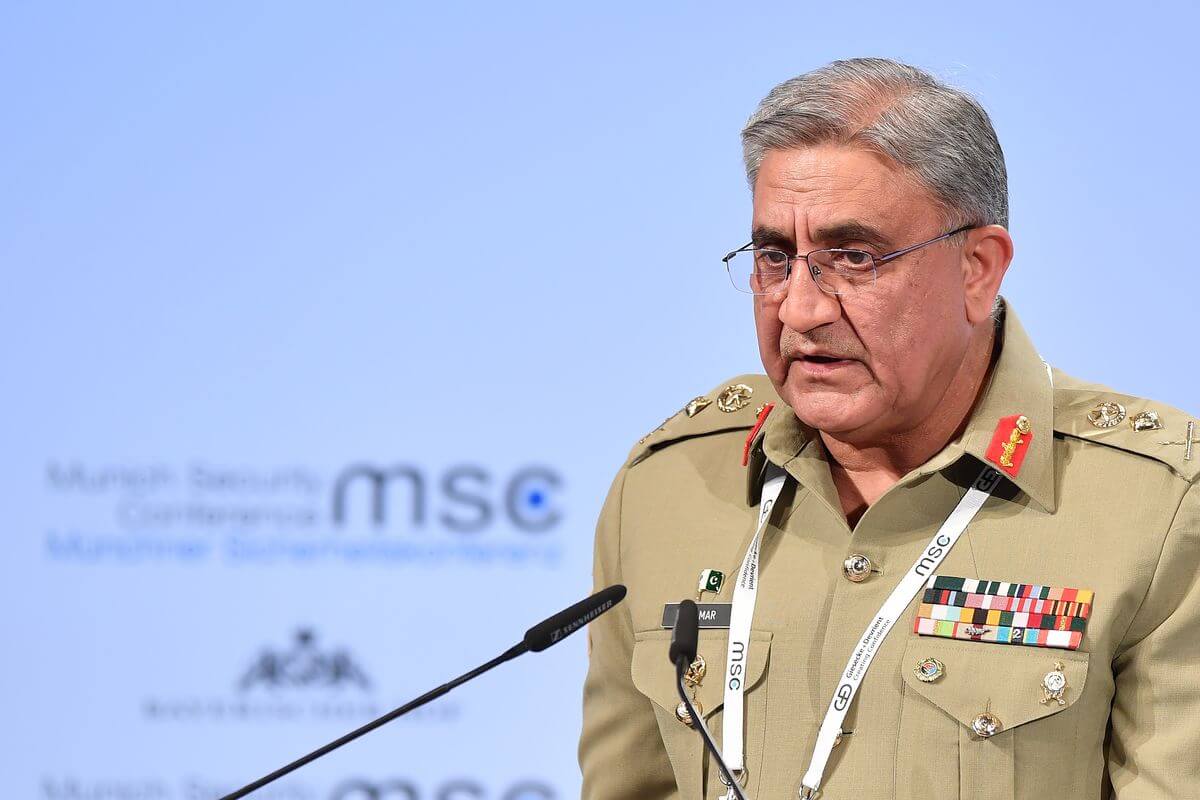Pakistan’s now-former Chief of Army Staff (COAS) General Qamar Bajwa said during his final speech on Wednesday that the military institution decided last February to bring an end to 70 years of the army’s “unconstitutional” and “constant meddling” in politics after politicians targeted the establishment using “false and made-up narratives.”
Citing examples of the military’s influence on governance, he said that the institution dealt with the Financial Action Task Force, facilitated the merger of the Federally Administered Tribal Areas, secured gas from Qatar, and even dealt with crises such as the COVID-19 pandemic and the influx of crop-destroying locusts.
He reassured, however, that the “army always went beyond the call of duty in the service of the nation and will continue to do so.”
During his speech at a Defence Day event in Rawalpindi, Bajwa said the institution came to the conclusion by looking at how the Indian army, which he said has not become the “target of criticism by its people”—despite its human rights violations—due to its separation from domestic politics.
Pakistan's most powerful man for the last 6 years, its army chief General Bajwa is expected to retire in 6 days. Pakistani media has already started writing critical pieces against him. Bajwa will probably retire as Pakistan's most unpopular army chief in the last 5 decades.
— Ashok Swain (@ashoswai) November 23, 2022
He added that his decision was subject to criticism by “some unscrupulous elements”, hinting at former Prime Minister Imran Khan, who has accused the army of being complicit in his ouster earlier this year.
Bajwa also rubbished Khan’s claim that the confidence vote against Khan was the result of a “foreign conspiracy.” Bajwa emphasised that the military would have acted against such an attempt, as “that would have been a major sin.”
While acknowledging the importance of constructive criticism, Bajwa lamented the use of “aggressive” and “undignified language.” He expressed his regret at the rise of “intolerance” in the country’s politics since Khan’s emergence to power in 2018.
Referring to the trust vote, he opined that Khan attempted to refuse to concede defeat by referring to the Sharif government as “selected” or “imported” by the army.
He urged political leaders to “reject this behaviour” and accept election results as a part of politics.
A poor choice by Gen. Bajwa to use the occasion of Defense Day to defend his personal legacy and attack his opponents. The speech, both in its content and delivery, was artless and tasteless. Bajwa’s successor must truly learn from his mistakes.
— Arif Rafiq (@ArifCRafiq) November 23, 2022
Nevertheless, he declared that the army has “moved forward” and begun its “catharsis.” He urged the political institutions to do the same and “introspect their behaviour.”
“The reality is that in Pakistan, institutions, political parties and civil society – they have all made mistakes,” Bajwa remarked.
Keeping this in mind, he asserted, “It is time political parties promote democratic culture in Pakistan, learn to co-exist and keep aside their differences to put Pakistan on the path of progress.”
Bajwa also emphasised the need for political unity in mitigating the country’s “serious economic” struggles, which demand “political stability.”
At the event, he also spoke of the 1971 civil war that resulted in Bangladesh’s independence from Pakistan. He said, “I want to correct some facts here. Firstly, former East Pakistan was a political failure and not a military one.” Stating that a meagre 34,000-person Pakistani army fought against 250,000 Indian soldiers and 200,000 members of the Mukti Bahini, he applauded the soldiers’ brave fight and exemplary sacrifice.
Lt Gen Asim Munir to be Pakistan’s New Army Chief, Lt Gen Sahir Shamshad Mirza to be Pakistan’s New Chairman Joint Chief’s of Staff Committee. #Pakistan
— Anas Mallick (@AnasMallick) November 24, 2022
Bajwa has been replaced by Lieutenant General Asim Munir, who was formally appointed to the role of COAS on Thursday, bringing an end to Bajwa’s six-year tenure, which was set to end in 2019 but was extended by then-PM Imran Khan.
Earlier this week, Defence Minister Khawaja Asif revealed that he had sent PM Shehbaz Sharif a summary of the recommendations for Bajwa’s replacement. The army provided the names of six senior army officials to the Ministry of Defence on Tuesday. Asim Munir was the senior-most army official on the list of recommendations.
Former PM Khan underscored that while he did not have an issue with any of the recommendations, he wanted the decision to be taken “on merit.”
The Pakistani army holds significant influence over domestic politics in Pakistan. In fact, the country has been ruled by a military government for half of its 75 years of independence. More concerningly, no PM has successfully completed their term as the head of the government.

